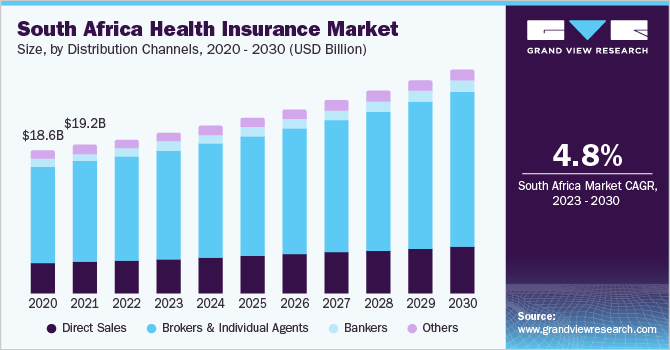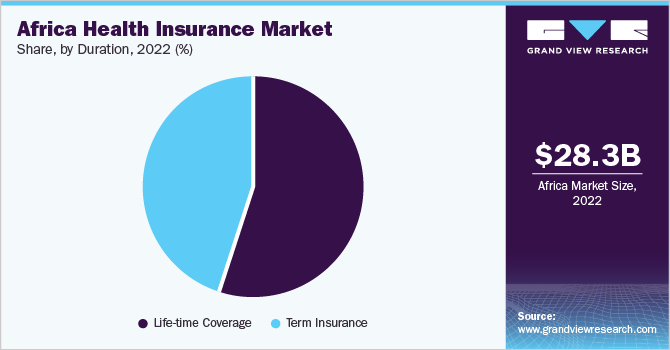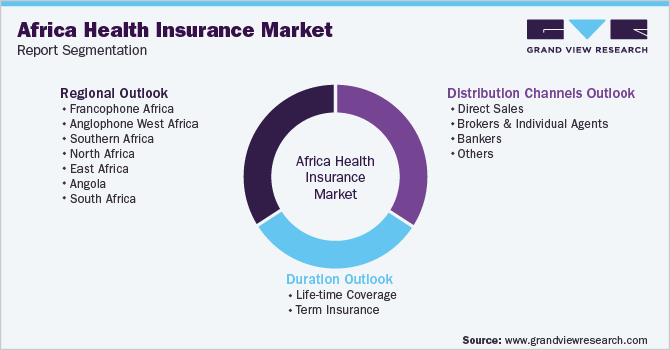
Africa Health Insurance Market Size, Share & Trends Analysis Report By Duration (Life-time Coverage, Term Insurance), By Distribution Channel (Direct Sales, Bankers), By Region, And Segment Forecasts, 2023 - 2030
- Report ID: GVR-4-68040-050-1
- Number of Pages: 87
- Format: Electronic (PDF)
- Historical Range: 2018 - 2021
- Industry:Healthcare
Report Overview
The Africa health insurance market size was valued at USD 28.3 billion in 2022 and is expected to expand at a compound annual growth rate (CAGR) of 5.26% from 2023 to 2030. The demand for health insurance in the region is driven by factors such as rising medical service costs and an incease in daycare procedures.Inflation in medical schemes is frequently higher in South Africa than the Consumer Price Index (CPI), which causes private healthcare costs to rise faster than anticipated pay increases.

The African health insurance sector is expected to be dealing with a number of difficulties in the Q1 of 2023. The COVID-19 economic consequences and economic stress are still being dealt with. Companies and people who are still having financial difficulties put pressure on insurance. Both the volumes and profitability of a new business are low. To revitalize their markets in response, insurers have promoted products between funeral coverage and underwritten policies or launched new products and coverage alternatives.
An increase in the usage oftelemedicinein the region is expected to boost the market growth. The recent UNDP Insurance and Risk Finance report examines the potential for collaboration between business, health, and technology. According to the report, telemedicine can provide affordable health insurance to 186 million individuals in sub-Saharan Africa. This accounts for over half of the region's population without access to healthcare. The report estimates that 343 million individuals could, in principle, get health insurance if the affordability threshold assumptions are met, at an estimated yearly cost of about USD 25 billion.
The African insurance market has already experienced tremendous innovation and disruption as a result of player competition, with insurers using technology to target particular markets or services and reduce costs. Novel alliances between online platforms and insurers are also developing.For instance, Blue Wave in Kenya serves the mass market in East Africa by making micro-insurance products available on mobile devices.
Furthermore, to guarantee the solvency and sustainability of insurance companies, several African governments are strengthening regulations and capital requirements. This is anticipated to support the development of greater, stronger businesses as well as increase the number of jobs being created and the industry's capacity. Such reforms are expected to build consumer trust and public awareness, resulting in market growth.
Distribution Channel Insights
The brokers and individual agents segment dominated the overall market with the largest revenue share of 67.54% in 2022. Agents can fully understand a client's insurance requirements, including life and health while also taking into account the client's personal circumstances. Moreover, agents serve as the client's long-term representative for the duration of the policy about any changes or when handling claims.
The direct sale segment is expected to hold a significant revenue share. This is attributed to the high advantages of direct-to-consumer sales for insurance carriers. As coverage is bought directly from the insurance company, there is less need for assisting agents and third-party sales in the sales process, among other things. Moreover, instead of relying on third parties, carriers can gather client data directly.
Duration Insights
The life-time coverage segment dominated the Africa health insurance market with the largest revenue share in 2022.Purchasing a life-time coverage insurance plan can offer specific advantages, which is expected to bode well for the growth of the segment. The advantages of life-time coverage insurance include the constant premium in the lack of increasing cash value of the plan and death benefit to the chosen beneficiary after the policy expires.

The term insurance segment is expected to grow at a lucrative compound annual growth rate of 6.61% over the forecast period. This is due to theterm insurance offers basic protection with a limited time frame and is typically the least expensive kind of life insurance.
Regional Insights
South Africa accounted for the largest market share in 2022. This can be attributed to the high number of key players and strong government support. The new National Health Care Insurance in South Africa is continuously working to improve the nation's healthcare infrastructure and implement the national healthcare insurance legislation. It aims to ensure that every citizen has access to medical services in both the public and private sectors. Both employers and employees would contribute to the funding of the insurance.
North Africa is expected to hold a significant market share in the coming years. Morocco, like many other African countries, depends on an insurance program to support its public clinics and hospitals.They are of a level well below first-world standards for a developing nation.So, it stands to reason that international citizens would favor the private sector for their medical needs. Private health care is incredibly expensive in the nation, thus insurance is necessary.
Key Companies & Market Share Insights
To increase their market position, major companies in the industry are engaging in a variety of strategic initiatives, including alliances, partnerships, the launch of new services, and geographic expansion. For instance, in May 2022, Santam entered into a partnership with Allianz to build the largest pan-African non-banking financial services organization on the continent. Due to this alliance, clients throughout Africa are expected to gain access to the knowledge and resources of two well-known companies. Some prominent players in the Africa health insurance market include:
Santam
Allianz Care
Cigna Global
Aetna International
Globality Health
Bupa Global
Clements Worldwide
Global Underwriters
IMG
Insured Nomads
Africa Health Insurance MarketReport Scope
Report Attribute |
Details |
Revenue forecast in 2030 |
USD 50.3 billion |
Growth rate |
CAGR of 5.26% from 2023 to 2030 |
Base year for estimation |
2022 |
Historical data |
2018 - 2021 |
Forecast period |
2023 - 2030 |
Quantitative units |
Revenue in USD billion and CAGR from 2023 to 2030 |
Report coverage |
Revenue forecast, company ranking, competitive landscape, growth factors, and trends |
部分覆盖 |
Duration, distribution channels, region |
Regional scope |
Africa |
Country scope |
Francophone Africa; Anglophone West Africa; Southern Africa; North Africa; East Africa; Angola; South Africa |
Key companies profiled |
Santam; Allianz Care;Cigna Global; Aetna International; Globality Health;Bupa Global; Clements Worldwide; Global Underwriters; IMG; Insured Nomads |
Customization scope |
Free report customization (equivalent up to 8 analyst’s working days) with purchase. Addition or alteration to country, regional & segment scope. |
革命制度党cing and purchase options |
Avail customized purchase options to meet your exact research needs.Explore purchase options |
Africa Health Insurance Market Report Segmentation
This report forecasts revenue growth at regional and country levels and provides an analysis of the latest industry trends in each of the sub-segments from 2018 to 2030. For this study, Grand View Research has segmented the Africa health insurance market report based on duration, distribution channel, and region:

Duration Outlook (Revenue, Billion, 2018 - 2030)
Life-time Coverage
Term Insurance
Distribution Channels Outlook (Revenue, Billion, 2018 - 2030)
Direct Sales
Brokers and Individual Agents
Bankers
Others
Regional Outlook (Revenue, USD Billion, 2018 - 2030)
Francophone Africa
Anglophone West Africa
Southern Africa
North Africa
East Africa
Angola
South Africa
Frequently Asked Questions About This Report
b.The Africa health insurance market size was estimated at USD 28.3 billion in 2022 and is expected to reach USD 29.6 billion in 2023.
b.The Africa health insurance market is expected to grow at a compound annual growth rate of 5.26% from 2023 to 2030 to reach USD 42.4 billion by 2030.
b.Life-Time Coverage dominated the Africa health insurance market with a share of 55.89% in 2022. The purchasing of a life-time coverage insurance plan has specific advantages. The advantages of life-time coverage insurance includes: in the lack of increasing the cash value of your plan, premiums remain constant, after the policy expires.
b.Some key players operating in the Africa health insurance market include Santam, Allianz Care, Cigna Global, Aetna International, Globality Health, Bupa Global, Clements Worldwide, Global Underwriters, IMG, Insured Nomads.
b.Key factors that are driving the market growth include rising medical service costs and an increase in daycare procedures. Inflation in medical schemes is frequently higher in South Africa than the Consumer Price Index (CPI), which causes private healthcare costs to rise faster than anticipated pay increases.





